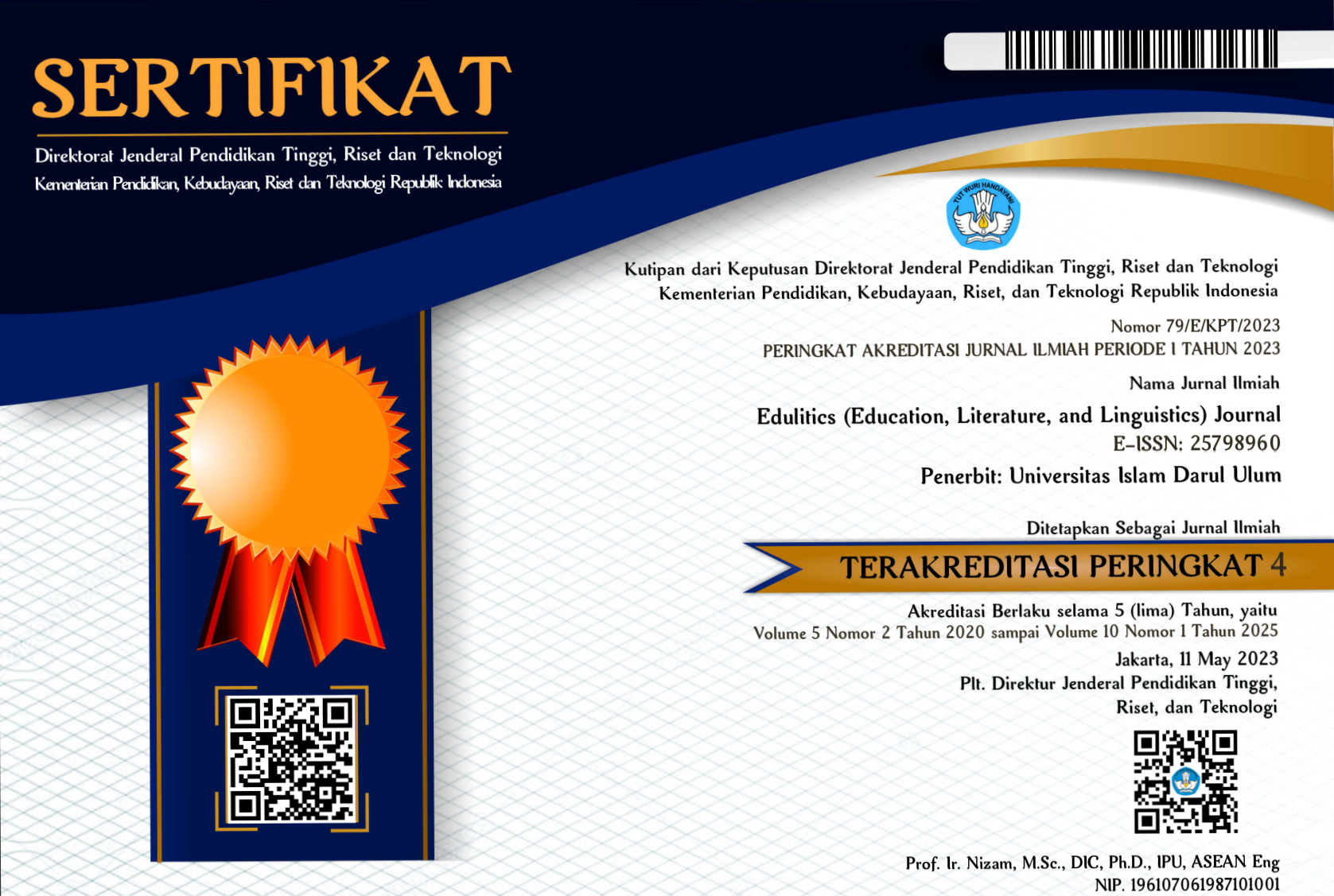Intensive English Course in Online Class Through WhatsApp and English Discovery as MALL Platform in Speaking
Abstract
Technology in education is used as a tool to achieve learning goals. The utilization of technology in the field of education can make it easier to get information. This research aimed to investigate the utilization of technology to find out how students respond to using WhatsApp as a Mobile-Assisted Language Learning (MALL) platform in learning outcomes in speaking skills. The researcher used a narrative qualitative method as a research design which came from observation, questionnaires, and interviews. Moreover, the research design for the students’ responses observed the teaching-learning process. The subjects of this research were 20 students in the second semester of the academic year 2022/2023 at Universitas Muhammadiyah Surabaya. This research showed that WhatsApp as a Mobile-Assisted Language Learning (MALL) platform makes students interested in and enjoy learning English through Intensive English Courses in online classes. Therefore, this learning medium is online learning with a collection of substances open on the English Discoveries platform. In online learning, speakers can check how understudy learning comes about particularly through the Teacher Management System (TMS) hence, teachers can continuously grant input for each student’s online learning advance. Since they can learn anywhere and anytime that was as a new experience in learning English for their daily activities in speaking ability.
Downloads
References
Arsari, M. H. A., Sumarni, S., & Darmahusni, D. (2023, June). Mobile Assisted Language Learning (MALL) in English Language Education. In English Language and Literature International Conference (ELLiC) Proceedings (Vol. 6, pp. 370-379).
Bates, T., & Sangrà, A. (2011). Managing technology in higher education: Strategies for transforming teaching and learning. San Francisco: Wiley
Fatmawati, L., Sofeny, D., & Zahro, S. K. (2021). Students’ Attitudes Toward The Transformation of Online to Offline Learning in EFL Classroom. IJECA (International Journal of Education and Curriculum Application), 4(3), 264-272.
Firmansyah, S. A., Mayasari, L., & Hesmatantya, V. (2022). Students’ perception towards blended learning using English discoveries at the University of Muhammadiyah Surabaya. JONED: Journal of Nusantara Education, 1(2), 53-59.
Fischer, C., Baker, R., Li, Q., Orona, G. A., & Warschauer, M. (2022). Increasing success in higher education: The relationships of online course taking with college completion and time-to-degree. Educational Evaluation and Policy Analysis, 44(3), 355-379.
Fisher, L. B., Curreri, A. J., Tan, E. K., & Sprich, S. E. (2023). Cognitive Techniques. In The Massachusetts General Hospital Handbook of Cognitive Behavioral Therapy (pp. 19-38). Cham: Springer International Publishing.
Hamsia, W., & Roifah. (2023). Using interactive media of spotify in listening comprehension for students in intensive english course of language center in universitas muhammadiyah surabaya. JEELL: Journal of English Education, Linguistics, and Literature, 9(2), 1-11.
Hamsia, W., Riyanto, Y., & Arianto, F. (2021). Online Learning for English Language Learners During Covid-19 Pandemic in Muhammadiyah University of Surabaya. Journal of Education and Practice, 12(9), 97-104.
Kaçar, T., Terzi, R., Arıkan, I., & Kırıkçı, A. C. (2021). The Effect of Inquiry-Based Learning on Academic Success: A Meta-Analysis Study. International Journal of Education and Literacy Studies, 9(2), 15-23.
Karmini, N.W., Nugrahanti, T.P., Ramadhan, I., Rusliandy, R., & Sukomardojo, T. (2023). Hybrid Learning: Strategies to Attract Student Learning Interests and Outcomes on Post Pandemic. AL-ISHLAH: Jurnal Pendidikan, 15(2), 2275-2283.
Lutfi, N. (2020). The Integration of MALL to enhance students speaking skill: An Autonomous learning model. Journal of Foreign Language Teaching and Learning, 5(1), 1-19.
Mallillin, D., Mallillin, J. B., Laurel, R. D., Carag, E., & Mallillin, L. L. (2020). Integration of Knowledge Through Online Classes in The Learning Enhancement of Students. European Journal of Open Education & E-Learning Studies, 19-34.
Maritsa, A., Salsabila, U.H., Wafiq, M., Anindya, P. R., & Ma’shum, M. A. (2021). Pengaruh teknologi dalam dunia pendidikan. Al-Mutharahah: Jurnal Penelitian Dan Kajian Sosial Keagamaan, 18(2), 91-100.
Mutiaraningrum, I., & Nugroho, A. (2021). Smartphone-based mobile assisted language learning application in higher vocational education in Indonesia. JEES (Journal of English Educators Society), 6(1).
Puspitasari, I.N.N. (2021). Combination of synchronous and asynchronous models in online learning. Jurnal Pendidikan Islam Indonesia, 5(2), 198-217.
O'Dowd, I. (2018) Examining engagement with an online toolkit for academic writing in blended-learning initial teacher education programmes. In Conference Proceedings: The Online, Open and Flexible Higher Education Conference, Denmark 10-12 October 2018 (pp. 128-138).
Sage, K., & Piazzini, M. (2020). Flip It or Click It: Equivalent Learning of Vocabulary From Paper, Laptop, and Smartphone Flashcards. Journal of Educational Technology Systems, 49(2), 145-169.
Singh, J., Steele, K., & Singh, L. (2021). Combining the Best of Online and Face-to-Face Learning: Hybrid and Blended Learning Approach for COVID-19, Post Vaccine, & Post-Pandemic World. Journal of Educational Technology Systems, 50(2), 140-171.
Sofeny, D., Fadhilawati, D., & Hidayah, N. N. (2022). Boosting the English vocabularies of young learners through Tik-Tok application in digital era. Jurnal Sinestesia, 12(1), 58-65.
Utami, L.P., & Prestridge. S., (2023). Effective Remote Language Teaching. In Language Education Programs: Perspectives on Policies and Practices (pp. 235-254). Cham: Springer International Publishing.
Vigneshwari, S. (2022). Effectiveness of MALL in developing speaking skill of the esl learners. International Journal of Novel Research and Development (IJNRD), 7(3), 433-440.
Zahro, S. K. (2021). Unintelligible Speech: Listeners' Awareness to Indonesian-Accented Speech with Pronunciation Errors. Language Literacy: Journal of Linguistics, Literature and Language Teaching, 5(1).

This work is licensed under a Creative Commons Attribution-ShareAlike 4.0 International License.
Authors retain copyright and grant the journal the right of first publication with the work simultaneously licensed under a Creative Commons Attribution-ShareAlike 4.0 International License that allows others to share the work with an acknowledgment of the work's authorship and initial publication in this journal.
Authors are able to enter into separate, additional contractual arrangements for the non-exclusive distribution of the journal's published version of the work (e.g., post it to an institutional repository or publish it in a book), with an acknowledgment of its initial publication in this journal.
Authors are permitted and encouraged to post their work online (e.g., in institutional repositories or on their website) before and during the submission process, as it can lead to productive exchanges and earlier and greater citation of published work.







_(1).png)


